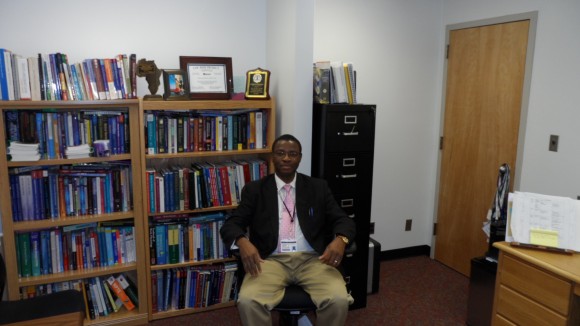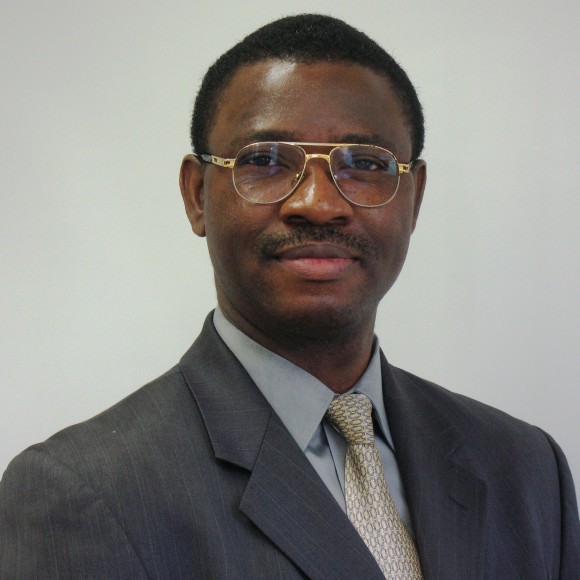A Conversation With Dr. Emmanuel John, Physical Therapy’s Newest Director From Nigeria to Kansas to California, Dr. Emmanuel John's Journey To Chapman Has Taken Him Everywhere
October 2, 2015
Dr. Emmanuel John is a man that likes to laugh. You get that sense upon meeting him, and his laugh isn’t nervous or over-the-top or annoying in even the slightest way – it’s just warm and genuine. I met Dr. John, the newest director of Physical Therapy for Crean College, just before the first week of school and you could feel an amount of excitement radiating off of him. Unbeknownst to me, the date of our meeting was one of his first times over on the Palm side of campus, and he was a bit late trying to find where we meet (which was in Von Neumann Hall, just on the other side of Crean). But the man is endearing and charming, and you can sense that his detour was likely filled with wonderment about the campus and its size and scope. Even after our interview ended, I walked with him back towards the main campus and his excitement about not only being the new director of Physical Therapy, but just his love of Physical Therapy as a concept, was oozing out of him. Suddenly, I was also excited about PT.
Question: So first off, were you born in Nigeria or did you just go to University of Lagos (located in Nigeria)?
Answer: I was born in Nigeria but not raised in Nigeria… I grew up there and was there for the first 36-37 years of my life. So that’s where I went to college.
Q: And how old are you?
A: I think I should be 47 (
Laughs)
Q: And then University of Kansas after that… that’s a bit of a change.
A:
(Laughs)
Yes, yes it was. I knew I wanted to be in academia and for you to be in academia you have to have your doctorate and I decided I didn’t want to do it in Nigeria because, as of the time, they didn’t have graduate programs in Physical Therapy that I would’ve loved to do. So I kept looking, and fortunately for me my mentor was at the University of Kansas and was the chair of the program and I coincidentally came in touch with him over the internet and then it happened.
Q: And that must be a bit of a culture shock, to spend time in somewhere that’s just a tad bit different than Nigeria like Kansas.
A: I was there for 4.5 years from 2002-2006.
Q: And you never went back?
A: I have friends there and I go back and forth. I was actually there about 4 or 5 weeks ago.
 Q: So let’s rewind and start at the beginning – why physical therapy?
Q: So let’s rewind and start at the beginning – why physical therapy?
A: I accidentally got into physical therapy by accident, actually. In my country we call it physiotherapy and I had never heard of that before. We have a bridge between high school and college (in Nigeria) called “High School Certificate” or advanced level, it’s like the equivalent of two years of college. If you complete that then you move on to college and only spend three years rather than four or five.
Q: Like an Associates Degree in this country?
A: Just like that. So what happened was my biology teacher was asking us in the science class, which was about 15 people, what we wanted to be when we grew up? And about ten of us said we wanted to study medicine. And she said “What’s wrong with you guys? Why medicine? Why not physiotherapy? It’s a very good profession.” And people (in the country) at that time needed physical therapists so she knew what she was talking about. And I said “Okay, I’ll take a look at it.” And I had been trying to get into medicine for about three years and I’d been unsuccessful and that’s why I picked physical therapy.
Q: And did you feel good about that decision immediately?
A: Ummmm not immediately. Because my thought was “Lemme go into Physical Therapy for one year and then I’ll switch back over (to medicine)” and I attempted to do that and I actually went to (my teacher) and she linked me with someone at the university who could help me switch over and they said “No! Unfortunately we just made a policy and no more crossing over! Whatever you came in with is what you end up with.” (Well) my first year was just basic medical sciences similar to what we have here (at Chapman), then the second year you get to go over to the medical campus. Well the second year we (had) our orientation in the library and my eye just went to a physical therapy journal, and I opened it and I was surprised what I saw and what I learned from about physical therapy from that journal. And that changed my world. And I didn’t want to be anything other than a physical therapist.
Q: That’s funny that you fought it for so long and actively didn’t get into medicine for three years and then this random journal just cemented it. What would’ve you have done if physical therapy hadn’t presented itself at any point?
A: I would’ve still tried to get into medicine still, but my dad was trying hard to get me into business. At that time in Nigeria a lot of the financial industry was coming up and holding a lot of promise for young people but my heart just wasn’t in it, I wanted to be in the health sciences.
Q: What was in the journal that just clicked for you?
A: What clicked with me was that, with that journal, I couldn’t believe the amount of need for physical therapists. That was a British journal for PT and I couldn’t believe there was a field with so much promise.
Q: So now you’re going through schooling…

A: So I went through school, and just jumped in. I actually became the president of the class; I became the president of the Nigerian Association of Physiotherapy Students. I did a lot of stuff that’s even beyond me to explain how or why I got to do all of it. I remember there was a time when one of my colleagues in the medical school he studied medicine and he had me talking about PT. We had dental students, medical students and two physical therapy students all in the same room and someone asks “Which one is the best profession?” *laughs* and I was talking about PT and one of them looked at me and said “You are OBSESSED with physical therapy.”
Q: And you still want to make a difference in Nigeria and still regularly go back…
A: I’m still heavily invested in Nigeria. I have a passion and it came from that moment in my second year where I found that journal. And I realized that physical therapy is so needed that people don’t even know it. And people don’t miss what they don’t know. And since I do know it’s needed, it’s my passion. And since going back to Nigeria, and not just Nigeria but to Africa to help, if I can remember my figures correctly in the US there is one physical therapist to every 2400 Americans but in Africa as a whole, there is one PT to every 14,000 people. It’s pretty severe. And the problem we’re having is that we can’t get government organizations to fund rehabilitation professions in Africa. This is because the country as a whole is in need of basic medical amenities, and people are more interested in “okay here are 10,000 meds, and one million children didn’t die from malaria. That makes more news than giving $1 million to some physical therapy programs somewhere, and you can’t quantify it – people aren’t dying. The problem is you keep people from dying but now no one is interested in their quality of life.
Q: So how do you change that?
A: I’m working towards that. It’s quite challenging. That’s what I’m trying to say – it’s hard to get funding to do all of that. You can say that you helped 5,000 people who are crippled and are now walking, but it doesn’t get as much news as 10,000 that should have died are now alive.


